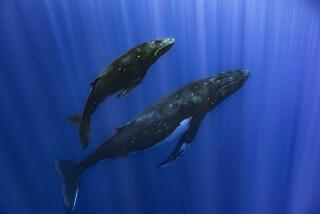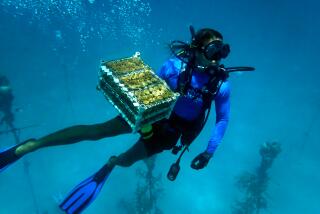Study links coral growth to sound
- Share via
Coral larvae, tiny hair-covered sacs of cells, can “hear” reefs and actually swim toward them, researchers report. The finding suggests that sound is far more important in underwater ecosystem development than previously thought.
Further, marine biologists say, human noise pollution has the potential to block the larvae’s ability to seek out nearby reefs and settle there, ultimately harming other marine life.
Coral are tiny sea creatures that build the rocky, often colorful structures associated with them; these structures ring islands and can span thousands of miles. In doing so, they provide an important ecological backbone for the world’s marine life.
In the study, published online Friday in PLoS One, the researchers analyzed the movement of coral larvae inside tanks, setting up the tanks in the shallow waters. They used loudspeakers to broadcast coral reef sounds from different directions.
Though humans swimming by a coral reef might hear only the bloop-bloop of their own air bubbles, that’s because human ears aren’t well suited to hear underwater, said senior author Stephen Simpson, a marine biologist at the University of Bristol. But as fish scrape the surfaces of the reef and communicate with one another through popping noises, snaps, grunts and chirps, they produce “a real cacophony of noise” to other marine life, Simpson said.
The researchers found that the baby coral inevitably swam toward the speakers, even when the speaker was above them (the larvae have a natural tendency to swim downward).
The scientists think that the hair cells covering the larvae’s tiny bodies sense movement produced by the sound waves, and use those hairs to swim toward the sound, Simpson said.
Many coral reefs worldwide have been dying, and Simpson pointed out that human activity in the ocean could be making enough noise to interfere with the baby coral’s ability to find safe places to settle.
“I’d never heard anyone hypothesize about coral detecting sound before,” said Ann Tarrant, a marine biologist with the Woods Hole Oceanographic Institute who was not involved in the study.
“It’s really novel and interesting. … We worry about noise from boats, wind turbines and sonar affecting [creatures] like whales, but this shows noise in the environment could be affecting all different kinds of animals we hadn’t even considered.”







